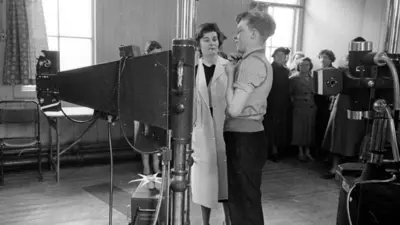We've updated our Privacy and Cookies Policy
We've made some important changes to our Privacy and Cookies Policy and we want you to know what this means for you and your data.
The end of Cameron's first war?
- Author, Nick Robinson
- Role, Political editor
He did not say "rejoice at that news". He did not declare "mission accomplished". The prime minister chose instead to "remember all of Colonel Gaddafi's victims".
Even at what looks likely to be the end of his first war David Cameron was determined to look and sound different from previous war leaders.
Now, as before, his unspoken message has been that "This is not Iraq. I am not Tony Blair".
He has at all times emphasised Britain's national interest in the removal of Gaddafi - reminding people of his role in the Lockerbie bombing, the murder of PC Yvonne Fletcher and the supply of semtex explosives to the IRA.
He has talked of implementing the will of the United Nations and working in co-operation with Arab states. He has stressed that Britain's role would be limited to bombing from the air and never involve boots on the ground.
Privately David Cameron will feel vindicated.
When he first told the House of Commons on 28 February that "We do not in any way rule out the use of military assets. We must not tolerate this regime using military force against its own people" many wondered nervously whether he would, like Tony Blair, be sucked into a long running, divisive and ultimately unwinnable war which would cost not just many lives but vast sums of public money.
At all times he insisted that it was intolerable to do nothing in the face of the threat of massacres in Libya but that he was only prepared to act so long as it did not involve British ground troops.
Future model?
When Tripoli was liberated he insisted that "this has not been our revolution but we can be proud that we have played our part".
Some claim that this is a new model for military interventions against dangerous dictators.
Others point out that if that's true it is not a model which anyone is talking of using in Syria, Iran or, even, Zimbabwe.
Image source, Reuters
In truth, there are few dictators like Gaddafi whose neighbours want to see him gone and whose armed forces do not pose a threat to the region or the world.
The question tonight is how this will affect David Cameron's thinking.
When Tony Blair won his first war in Kosovo there can be little doubt it convinced him of the value of military action which he then pursued in Sierra Leone and Afghanistan and, of course, finally Iraq.
PS. I am told that the prime minister first heard the news that Gaddafi may have been captured at noon. Ministers knew that Gaddafi's forces were fighting hard to protect a part of Sirte but did not know for certain that Gaddafi was there.
Nato has confirmed that there was an airstrike on Sirte this morning at 08:30 local time. Nato said its warplanes targeted two military vehicles in the city which were part of a larger group of vehicles being manoeuvred. There is still no clear answer about whether that strike was connected with Gaddafi's capture and killing.
Top Stories
More to explore
Most read
Content is not available








